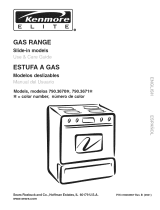
3
Finding Information
TABLE OF CONTENTS
Finding Information ............................................ 2
Make a Record for Future Use......................... 2
Model and Serial Number Location.................. 2
Questions? ....................................................... 2
Table of Contents ............................................. 3
Safety ................................................................... 4
Important Safety Instructions ........................ 4-7
Feature Overview ................................................ 8
Your Slide-In Range ...................................... 8-9
Oven Rack Supports and Oven Vents ........... 10
Removing and Replacing Oven Racks............11
Oven Control Pad Functions ..................... 12-13
Getting Started .................................................. 14
Setting Clock at Power Up ............................. 14
Control Panel Display Modes......................... 14
Temperature Visual Display............................ 14
Oven Light...................................................... 15
Control Lock ................................................... 15
Setting the Kitchen Timer ............................... 15
Surface Cooking ............................................... 16
Location of the Burners .................................. 16
Placement of Burner Heads and Caps........... 16
Proper Burner Adjustment.............................. 16
Surface Cooking Utensils............................... 17
Flame size...................................................... 17
Setting Surface Controls ................................ 18
Using the Griddle............................................ 19
Setting the Warmer Oven ................................. 20
Warmer Oven Operation ................................ 20
Cooking Modes ................................................. 21
Baking ............................................................ 21
Cook Time ...................................................... 22
End Time ........................................................ 22
Broiling ........................................................... 23
Convection Baking ......................................... 24
Convection Convert........................................ 25
Rapid Preheat ................................................ 25
Convection Roasting ...................................... 26
Keep Warm..................................................... 27
Slow Cook ...................................................... 28
Dehydrating.................................................... 29
Defrosting....................................................... 29
Bread Proofing ............................................... 30
Perfect Turkey ................................................ 31
Temperature Probe ........................................ 32
Multi Stage ................................................ 33-34
Electronic Control Settings ............................. 35
User Preferences ........................................... 35
User Preference Menu................................ 35
Setting the Clock - Time of Day .................. 35
Setting Clock Display - On or Off ................ 36
Setting Time of Day Display - 12 or 24 hours ... 36
Adjusting Oven Temperature....................... 36
Setting Temperature Display - Fahrenheit
or Celsius .................................................... 37
Audio Control .............................................. 37
Setting Continuous Bake or
12 Hour Energy Saving ............................... 37
Resetting to Default Factory Settings ......... 37
Oven Controls ................................................... 38
My Favorites................................................... 38
Sabbath Feature........................................39-40
Care & Cleaning ................................................ 41
Using the Self-Clean Feature......................... 41
Starting the Self-Clean Cycle ......................... 42
General Cleaning ........................................... 43
Care and Cleaning of Stainless Steel ............ 44
To Remove and Replace Oven Door ............. 44
Special Door Care Instructions ...................... 44
Oven Light...................................................... 45
Broiler Pan Cleaning Tips............................... 45
Cleaning the Burner Grates,
Burner Caps and Burner Heads..................... 46
Porcelain Enamel Cooktop
Cleaning Instructions...................................... 47
Solutions to Common Problems ..................... 48
Baking Problems ............................................ 48
Solutions.................................................... 49-51
Warranty Information ........................................ 52




















